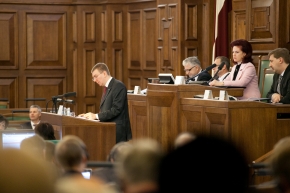 Gallery
Gallery
“In shaping the foreign policy of our country, the parliament’s task is to become a strategic debate forum where political goals and challenges are evaluated and discussed with particular emphasis on Latvia’s national interests,” stressed Speaker Solvita Āboltiņa during the annual foreign policy debate held at the Saeima on Thursday, 24 January.
“A parliament that is elected by the people and consists of representatives of the most diverse political parties is capable of holding a debate on such a level. I am truly glad that all political parties and individual members of parliament are ready to take part in this debate. In my opinion, it attests to our ability to think about the future of our country from a global perspective and to have a vision of tomorrow,” said the Speaker.
During the debate, Ojārs Kalniņš, Chairman of the Foreign Affairs Committee, called attention to the need to clearly define priority regions in Latvia’s foreign policy because the Ministry of Foreign Affairs cannot focus on the entire world at once. “If we think strategically about the opportunities that different regions open up to Latvia, our foreign policy can become instrumental in facilitating national interests. We have taken the right path; however, we have to move faster, further and more consistently,” said the Chairman.
Kalniņš mentioned six possible priority regions in Latvia’s foreign policy, namely, our neighbouring countries; the Baltic Sea region and the Nordic countries; the European Union and NATO; the region covered by the Eastern Partnership of the EU; Central Asia, including Afghanistan; as well as the Far East.
Zanda Kalniņa-Lukaševica, Chairperson of the European Affairs Committee, emphasised the role of national parliaments in the EU. “Active participation of national parliaments in the EU’s decision-making process is the key to enhanced democratic legitimacy of decisions adopted in Brussels,” said the Chairperson.
Kalniņa-Lukaševica also emphasised that the EU’s decisions should not be explained in Brussels but as close to citizens as possible and that members of the Saeima can have a significant role in this process. “We have to refrain from taking credit for every success of European policy on the national level and blaming “bad Brussels” for all losses and failures. I would refer to this political hypocrisy as the nationalisation of successes and Europeisation of failures,” said the Chairperson.
Edgars Rinkēvičs, Minister for Foreign Affairs, presented the report on the country’s accomplishments and planned future activities regarding foreign policy and EU matters. Twenty-seven MPs took the floor during the debate following the Minister’s report.
Pursuant to the Rules of Procedure of the Saeima, not later than by 16 January, the Minister for Foreign Affairs should submit to the Saeima the annual report, approved by the Prime Minister, on accomplishments and planned future activities in foreign policy. The report should also contain information on activities regarding European Union matters.
The first debate on the country’s foreign policy in the Saeima took place on 27 January 2011.
The foreign policy debate is held at the plenary sitting that is closest to the date of international recognition of the Republic of Latvia (26 January).
Transcripts and audio files of the sitting are available at the Saeima website (in Latvian): http://ej.uz/1938.
The annual report of the Minister for Foreign Affairs on country’s accomplishments and planned future activities in foreign and European policy is available at: http://ej.uz/7bty.
Photos from the foreign policy debate held at the Saeima are available at: https://www.flickr.com/photos/saeima/sets/72157632595586397/
When using the material, please give credit to the Saeima Chancellery.
Saeima Press Service







